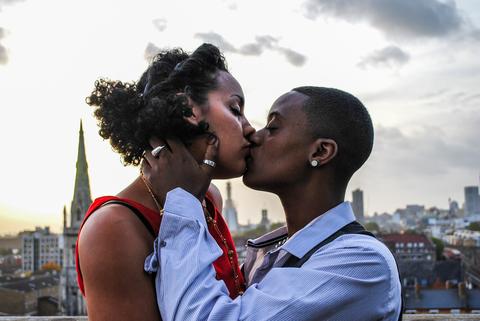We’re delighted to announce that our sixth set of Emotional Learning Cards entitled ‘What do relationships mean to you?’ is now available in store. Exploring sexuality, difference, gender, sexual expression and intimacy, this new resource will be of special interest to teachers and educators delivering Sex and Relationships lessons (SRE) and to couple therapists, psychotherapists and all creative therapists; especially those who work with adolescents and young adults. In this blog, Lyn French, A Space Director, continues to explore key themes reflecting the politics of gender. To find out more about our new cards contact us, join the mailing list at the top of the page or follow our Twitter feed.
What makes us who we are begins to take shape in early years. This is influenced by a number of factors including the messages we pick up from those around us. Whether we’re aware of it or not, our family’s notions of what it is permissible ‘to be’ or the opposite, ‘not allowed’, will be conveyed to us via what they say and do as well as by what is left unspoken. Culture, class and social norms as well as religious or political beliefs play their part. As we grow older our own personal histories, especially the meanings we give to our experiences, will also be in the mix.
In their quest to create their own identity, young people often question or challenge family norms, rejecting what might be perceived as out dated or limiting beliefs. This can be seen as a form of natural evolution reminding us that ideas and social constructs are not fixed in time but open to interpretation and can be re-configured in line with new knowledge and understanding. The break with the past may be abrupt involving pain, rejection, confusion and conflicts of loyalty. Or it could be a more gradual process, unfolding over time, accompanied by uplifting feelings linked to progress and the optimism generated by progress. Either way, shaping one’s own approach to ‘doing life’, begun in childhood on less conscious levels and coming to the fore in adolescence, never reaches a final act. We’re all in a dynamic relationship with the world around us, responding and interacting in a multitude of ways which, in turn, affects our evolving sense of self and our place in the world.
Artist Song Dong has found an eloquent and poignant way of crossing a family boundary both poetically and respectfully. His film ‘Touching My Father’ featured in our new set of cards What do relationships mean to you? is a projection of his own hand gently moving over his father’s face and shoulders as if lovingly caressing him. In fact, Song Dong has said that he has no memory of touching or hugging his father during his lifetime.

Song Dong ‘Touching my father’ 1997. Stills from single channel video. Courtesy the artist and Pace Gallery, Beijing.
In Chinese culture, physical contact between men of different generations is generally not encouraged and is even seen by some as socially unacceptable. What lies beneath the surface are implied ‘rules’ about what it is permissible to feel and how boys and men are allowed to relate to each other. Perhaps the intimacy of touch and the physical language of love and affection is viewed as a maternal prerogative and, as such, a potential threat to masculine identity if expressed. The basic human need to freely express tender feelings towards each other, and to hold and be held, is denied. On a deeper level, this norm ensures that eroticism or even sexual urges between men are kept well out of the picture.
Song Dong’s film suggests that he grew up to question his culture’s belief, and possibly yearned for a more tactile father/son relationship. Through his film, he has found a highly resonant way to express feelings towards his father while still respecting his Chinese heritage. Song Dong’s film also raises more widely applicable questions to do with social expectations which are still perplexing many today such as, ‘What defines so-called ‘masculinity’? If men express softer feelings to each other, does this diminish them in some way? Is talking about vulnerabilities with other men ok or is it far too exposing, even humiliating? If men cry in each other’s company, will this leave them feeling emasculated? Can men comfort and reassure each other through hugging and stroking or does this kind of behaviour immediately get interpreted as a sexual invitation?’ and so on.
Exploring gendering and questions of identity are also at the core of artist Christian Thompson’s work. As an Aboriginal Australian, he too, draws on his cultural heritage, coming at these themes from a very different angle to Song Dong.

Christian Thompson ‘Hannah’s Diary’ 2008 C Type Print. Image Courtesy the artist and Sarah Scout Presents, Melbourne and Michael Reid Gallery, Sydney & Berlin
In this self-portrait entitled ‘Hannah’s Diary’, also from our set What do relationships mean to you? Christian Thompson is wearing a white-blonde wig and a dress. He is perched in a tree and is holding a didgeridoo, a wind instrument traditionally played by men during ceremonial events. The dress he has on has ‘REALNESS’ printed in large capitals running down the front of it. Perhaps this word is given a strong presence as a way of inviting us to ask ourselves, ‘What makes something ‘real’ or it’s opposite ‘not real’? And how does this apply to our sense of self?’ Gender identity is not based on indisputable fact but instead on meanings constructed by society, meanings which quickly become ‘rules’ and expectations. Historically, and in some instances, still today, non-compliance can lead to being socially ostracised and discriminated against.
Stereotypes are also challenged in artist Campbell X’s film Stud Life, a romantic comedy about LGBT life in East London. The film, and this image taken from it, captures the way in which exploring identity can mean crossing lines between race, gender, class, culture and sexual orientation.

Campbell X ‘Stud Life’ 2013 Promotional Image for the film Stud Life Photo: Paula Harrowing. Courtesy the artist
One the main platonic relationships in the film’s storyline is between a lesbian stud JJ and her gay best friend Seb. This is a kind of friendship that isn’t talked about much and rarely features in cinema. Even though they are not the same gender, gay men and lesbians share similar same-sex worlds and there is often a strong bond between them. However, this kind of relationship is rarely fore-fronted in films, TV shows or club culture. Instead, they often take a mono-gendered approach. Depicting men’s gay life or the lesbian world can easily fall into peddling stereotypes rather than using the opportunity to present a more complex picture.
As well as internalising messages from our family in early years, we also take in ideas from mainstream and social media, often at the expense of looking at our own realities. It can take emotional and psychological work to figure out who we are, find ways to live with the often inevitable contradictions and tensions, and to get used to – even embrace – our differences.
You can continue to explore the themes explored in this blog using our A-Z of Relationships and A-Z of Emotions resources which are free to download here. F is for Femininity and M is for Masculinity tie in with the themes discussed. What do relationships mean to you? can be purchased in our store.